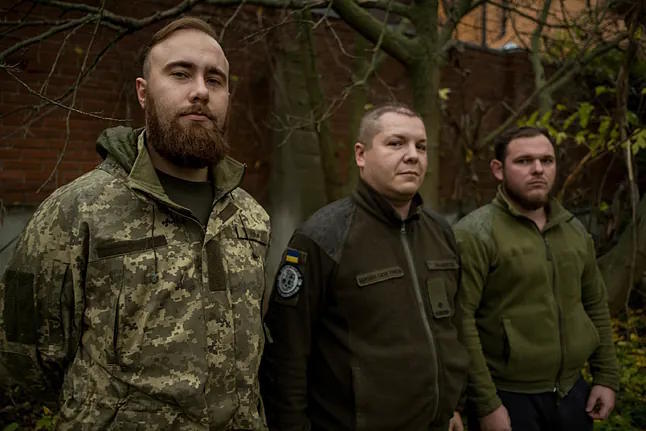Their daily work is never easy, but there was one day that Sergiy cannot forget: "One of our brigade members committed suicide in her room in Kramatorsk with her own gun, and I had to speak with her family. The problem is that they not only did not believe a word, but they said that someone had killed her."
It is a rainy day very close to the battlefront of Kharkiv. In a secret location, where we can hear the artillery in the background, we meet Commander Sergiy, Captain Rostislav, and Lieutenant Pavlo. They are all officers of Mechanized Brigade 72, better known as the Black Zaporiyians, in honor of the old black uniforms worn by the first defenders of the People's Republic of Ukraine in 1917.
These three officers perform an ungrateful but necessary task: contacting the families of the deceased and missing to provide the necessary support during mourning, prepare for the funeral, and help them with the immense bureaucracy to receive state compensation. "The first communication must be made by their recruitment office. After this official message, where they are already asked to contact us, we step in. Sometimes the relatives call us, and other times we have to call them because they remain in shock for several days," says Commander Sergiy.
- Why do they take so long to call you?
- Most know that their loved one is in combat and that death is a possibility, but others do not want to accept it.
Their unit, named "Civil-Military Coordination," requires high doses of empathy and some psychology to prepare women, husbands, children, parents, and mothers for the worst news and its consequences, but it is not always easy. Rostislav recalls a case that impacted him personally: "Recently, a close friend of mine from our brigade passed away. He was part of a mission considered secret, and we know exactly where his body is, but it is unrecoverable because it remained in the gray area. I had to lie to his mother and tell her that we were sure he had died in combat but that we did not know where he had fallen. I had to tell her that we would do everything we could to find him, but it is a lie," he says.
Burial of a Ukrainian soldier in Lviv.ALBERTO ROJAS
"The problem is not communicating that someone has died, but that someone has disappeared because compensation is not activated. It almost always means that they have fallen at some point on the front, but if their body does not appear, we cannot declare anyone dead. Some comrades rushed with their friend's family and declared him dead in an attack, but it turned out he was not dead but had fainted. Imagine the family's surprise when they were informed from Russia that he was there as a prisoner. It was a big mistake," Sergiy comments. The commander explains more about the intricacies of their work:
- What happens if the body is unrecognizable? Do you advise the relatives not to look at it?
- Yes, but we cannot prevent them from doing so. We always do a DNA analysis to determine that it is the person we are looking for. Still, there are people who refuse to bury that body because they do not believe it is their relative. We have several bodies in the morgue that no one claims despite the analyses.
- Is it so difficult to make them understand that?
- Sometimes our work is complicated. Seven comrades died in a basement when an aviation bomb collapsed an entire building on top of them. They were in a war zone where it was very difficult to excavate to get them out. Even so, they accused us of not doing everything possible to rescue them, went to the press, and even turned to activists to launch a campaign against us and accuse us. They developed the theory that they were all alive in the shelter. That was very tough for us because our own comrades were among the rubble. Finally, when we could access the site, we retrieved the bodies and were able to perform autopsies. Indeed, they died from the bombing.
Lieutenant Pavlo recalls that they have been doing this job for a long time, that they have already specialized, but that they cannot stop training in the psychological aspect of the matter, the most delicate part. "A person who dedicates themselves to this must have the ability not to let it affect them personally, to know how to isolate themselves. If you are someone with high sensitivity, who absorbs the pain of others, then you are lost."
Sergiy mentions another common difficulty in their work: that the family that needs to be notified of the death of their loved one has moved to another city, and no one knows exactly where they live. "That search task falls on us. We have to investigate their whereabouts and, when you finally find them, deliver the bad news ourselves. You are never fully prepared for that."
